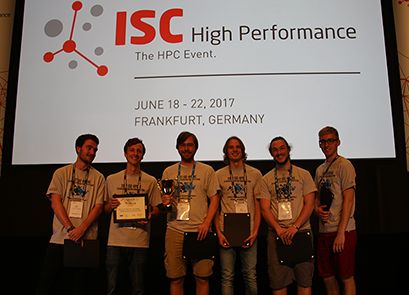NEWSFLASHES
GCS Celebrates Decade of Computing Excellence With Strong Showing at ISC17
Newsflash –

HLRS welcomes visitors to its booth at ISC17 in Frankfurt, Germany.
Copyright: Philip Loeper for ISCFive years ago, the three German supercomputing centres comprising the Gauss Centre for Supercomputing (GCS)—the High Performance Computing Center Stuttgart (HLRS), the Jülich Supercomputing Centre (JSC), and the Leibniz Supercomputing Centre (LRZ)—began attending the ISC High Performance conference (ISC) under the GCS banner.
At this year’s conference—which ran June 18–22 in Frankfurt, Germany—GCS staff provided a wide range of interactive exhibits, including videos about ongoing GCS research, augmented and virtual reality presentations, and demonstrations of cutting-edge monitoring and visualization programs.
Using a motorcycle, HLRS staff demonstrated an augmented reality air flow simulation. JSC staff showcased a live demo of its self-developed system monitoring tool, Llview. Staff at LRZ presented a visualization of convection currents within the Earth’s mantle using a head-mounted display. All the centres also presented videos and gave talks highlighting simulations and visualizations done at the three centres, the centres’ commitment to energy efficiency, and how the three centres support users’ applications.
Beyond the exhibition and GCS centres’ staffs’ regular active participation in panel discussions, birds of a feather sessions, tutorials, and session chair roles they regularly participate in during ISC, GCS employees also came together to celebrate 10 years of leading-edge German supercomputing.
During the conference’s opening session on Monday, June 19, MinDir. Prof. Dr. Wolf-Dieter Lukas, Head of Key Technologies at the German Federal Ministry of Research and Education (BMBF), announced the German strategy for the next decade of high-performance computing, and noted that GCS was an essential organization in accomplishing the German “smart scale” mission. The BMBF sees its “smart scale” strategy as increasing investment in not only computing power, but also the software advances and training needed to make the best use possible of next-generation machines.

Leadership from GCS and BMBF present the Gauss Award at the opening session at ISC17. From Left: GCS Managing Director Claus-Axel Müller, BMBF Head of Key Technologies MinDir. Prof. Dr. Wolf-Dieter Lukas, award recepient and Boston University doctoral candidate Emre Ates, and GCS Board of Directors chair Michael Resch.
“GCS is a good example that shows investment in research pays off,” he said. GCS’ primary funding agencies, the BMBF, and the science ministries of the states of Baden-Württemberg, Bavaria, and North Rhein-Westphalia, acknowledged GCS’ last decade of success by funding it to the tune of nearly €500 million for the next 9 years.
GCS Managing Director Dr. Claus-Axel Müller and GCS Board of Directors Chair Prof. Michael M. Resch also joined Lukas on stage and presented the Gauss Award, given to the conference’s best technical paper, to a team from Boston University (BU) and Sandia National Laboratories in the U.S. The award, accepted by team member and BU doctoral candidate Emre Ates, was given for the team’s paper, “Diagnosing Performance Variations in HPC Applications Using Machine Learning.”
On Tuesday, Ates presented the team’s paper during a 30-minute session, describing how the team built a framework using machine learning that can help diagnose performance anomalies for applications running on supercomputing resources, ultimately helping researchers improve code performance.
Toward the end of Tuesday’s exhibition, GCS staff invited press, users, friends of the GCS centres, and European partners to toast 10 years of GCS and hear Director Resch speak about the next 10 years. The catered event was well-attended, and the three GCS centre directors were available to meet and greet ISC attendees for the last two hours of the day's exhibition. The food also supported one of GCS’ major ISC-related investments—the undergraduate team it sponsored in the Student Cluster Competition.

Team FAU Boyzz of the Friedrich-Alexander-Universität Erlangen-Nürnberg, are winners of the LINPACK Benchmark Award at the Student Clustre Competition at ISC17. From left: Team Captain Phillip Suffa, Team Captain Jannis Wolf, Benedikt Oehlrich, Lukas Maron, Fabian Fleischer, Egon Araujo.
Copyright: GCSStudent Cluster Competitions take place at the world’s largest supercomputing conferences in Europe, North America, and Asia, and pit undergraduate teams against one another in a fast-paced, multi-day event that involves building a cluster computer and using it to run a variety of challenging applications while keeping to a very strict power limit. Teams are graded on speed through the high performance Linpack (HPL) benchmark, accuracy, energy efficiency, and application knowledge. At the end of the conferences, teams are given awards in various categories.
This year, GCS sponsored a team from Friedrich-Alexander-University Erlangen-Nuremberg (FAU). The 6-student team, FAU Boyzz, comprised of computational engineering, computer science, and medical engineering students, won the HPL award by achieving peak performance of 37.05 teraflops (1 teraflop equals 1 trillion floating point operations per second)—nearly tripling the result from last year’s ISC and setting a new record for HPL in the competition.
"The Gauss Centre for Supercomputing, who by definition is highly interested in drawing young talent's attention toward High Performance Computing, is always open to support up and coming HPC talent, also in the framework of these kind of events," explains Claus Axel Müller, Managing Director of the GCS. "We are well aware of the financial constraints students are facing when trying to participate in international competition, especially if travel and related expenses are involved. Thus we are happy to be of help, and we would like to sincerely congratulate the FAU Boyzz for their great achievements at ISC."
At this year’s ISC, GCS also released a new brochure in both English and German, Computing for a Better Tomorrow.